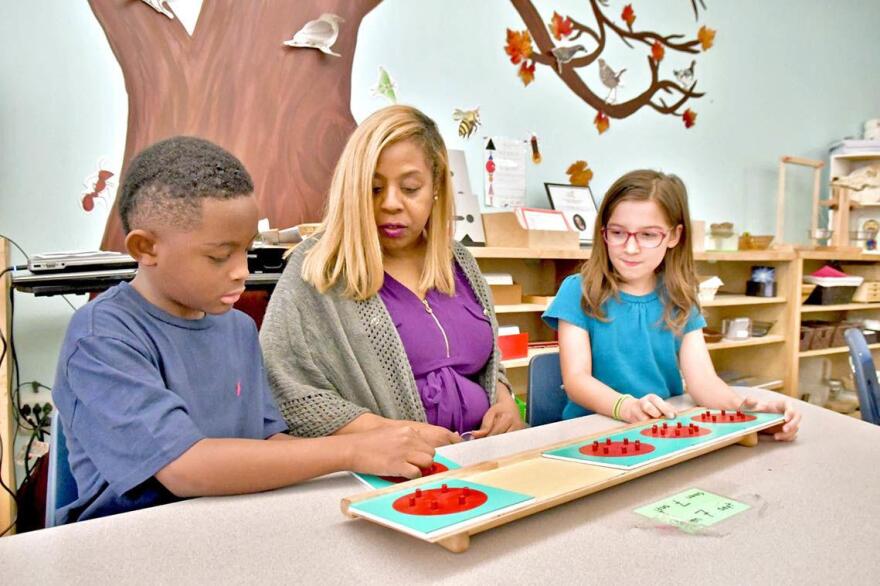City Garden Montessori, located in the Shaw neighborhood, is a preK-8 charter school committed to anti-biased, anti-racist (ABAR) practices. Finding Montessori-trained teachers is a national problem in general, said Christie Huck, executive director City Garden Montessori.
“Then when you add in our ABAR commitment and our deep commitment to equity, there just really are not training centers that prepare teachers to do Montessori in the public sector with an equity lens,” Huck said. “We are part of a national movement of folks trying to do this work, and there’s a deep need nationally.”
This summer, City Garden will launch its own training institute to prepare teachers to lead anti-biased, anti-racist Montessori classrooms in St. Louis and across the nation.
The first pilot cohort of 15 to 25 participants will be about half City Garden teachers. The other half will mostly likely be a mix of other St. Louisans and people from other states. The training will span three summers and two school years and include in-person sessions, a self-guided teaching practicum and virtual weekend seminars. Someone without teaching experience can take the training, and participants will receive Montessori certification through the program.
In July, Amira Mogaji joined City Garden as its chief academic officer to lead the teaching institute, as well as strengthen curriculum and instruction throughout the year. Mogaji’s role as a board member for the American Montessori Society is a high value for the school, said City Garden Principal Nicole Evans.
“It assures us that we are doing Montessori at a high level,” Evans said. “This is a really hard thing to create. We’ve been saying that for years — what we are creating here at City Garden doesn’t really exist.”
The institute’s mission is not only to prepare ABAR Montessori-trained educators in public school environments. It is also to “increase access to Montessori training among people of color and other historically marginalized groups,” according to the school’s strategic plan.
The institute is one step in the school’s 10-year plan to expand from the current 278 students to more than 2,300 and to open three new schools.
In 2019, City Garden received 60 kindergarten applicants for 30 slots. This coming fall, the school will expand to accepting 90 kindergarteners and opening two new classrooms at its current location on 1618 Tower Grove Ave. City Garden purchased a warehouse on Folsom Street, near the school, which will be converted into a campus for grades 1-8. In 2021, those grades will move to the new building and the current location will just be for preschool, kindergarten and the teaching institute, Huck said.
They are currently raising $10.8 million over the next five years for this part of the expansion -- and they already have a $2-million commitment from a funder, she said.
City Garden only accepts applications from families who live in the surrounding neighborhoods, or catchment areas. These include Shaw, Botanical Heights, Forest Park Southeast, Tiffany, and Southwest Garden neighborhoods. This fall, school leaders will be analyzing whether or not their boundaries need to expand and change, Huck said.
"The inequity in our region is literally killing our children"
“From the standpoint of demographics, we have a very particular mission here and want to make sure we serve a diverse population,” Huck said. “We’ve had a lot of changes in our catchment areas in the last decade since we opened.”
Huck was among a group of parents who realized in 2006 that she was not content with her sons growing up in a neighborhood where the white and black children did not attend the same schools.
“We were living parallel lives side by side, but still not interacting in each other’s lives in meaningful ways,” Huck said.
In 2006, Huck was part of a group of preschool parents in St. Louis city who decided they didn’t want to make the typical exodus to St. Louis County for quality public schools.
“We became keenly aware of the deep racial and economic segregation that continues to exist in our schools—and the tremendous inequity that goes along with this,” she said.
That’s why Huck and the group of parents founded City Garden to ensure that the neighborhood children learn and grow together, she said. Now in its 11th year, the school has enticed high-income families to move into the area, thus spurring development and gentrification in the zip codes it serves.
Over the years, City Garden has brought in national leaders to address racial and economic integration at community events it hosts. That’s why their expansion also includes opening up a Center for Equity to drive forward City Garden’s work on community organizing and policy advocacy, Huck said.
“Deep connection to our neighborhoods and advocacy and equity work have been part of our DNA since the beginning,” Huck said.
The first step will be to hire the center’s director in 2020. Over the next three to five years, the City Garden Center for Equity will help the community to build the knowledge it needs to organize and advocate for themselves around several issues — such as housing and development, maintaining economic and racial diversity, financial literacy and political power, according to the strategic plan. It will also act as a convener of like-minded individuals and help build coalitions, the plan states.
“The inequity in our region is literally killing our children and our community members,” Huck said at the school’s 2016 conference on equity in housing and education. “It is time for us to commit, collectively, to radical action for change.”
Rebecca Rivas is a reporter with the St. Louis American, a news partner of St. Louis Public Radio. This story was orignally published Sept. 19, 2019.
Send questions and comments about this story to feedback@stlpublicradio.org



